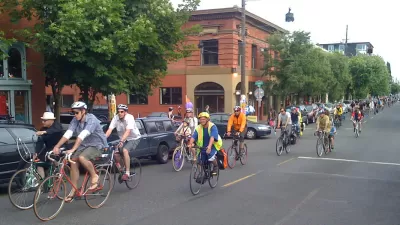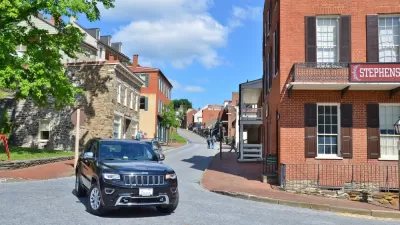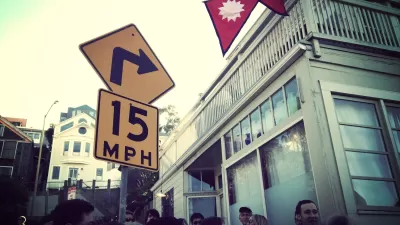The findings of a recent memo highlight the disproportionate effects of unsafe road conditions on low-income people and BIPOC communities.

Oregon's Department of Transportation has released a technical memo that outlines the effects of race and income on road safety and "draws a line between injury and fatality rates of non-drivers and the racial, income and geographic makeup of crash victims," reports Jonathan Maus for Bike Portland.
The findings in "Pedestrian Injury and Social Equity" show that "places with a higher concentration of people of color and poverty are much more likely to suffer injury or death while walking." While just nearly a quarter of Oregon's population lives in a Census tract with a high percentage of low-income and BIPOC residents, about 40% of non-driver injuries take place in these areas, which are often characterized by a "'harsh' transportation environment" and unsafe conditions. Without a comprehensive statewide database for pedestrian safety infrastructure, the study was unable to analyze how the presence or absence of such infrastructure impacts injury rates, signaling a need for more comprehensive data collection as a first step toward understanding the state's transportation equity landscape.
The findings are nothing new to bike and pedestrian advocates who study the issue, but "now that ODOT’s own data aligns with existing research, this information should be used to inform investment decisions" and prioritize needs such as a statewide infrastructure database.
FULL STORY: Oregon DOT shares first-ever internal research on how race and income impact road safety

Maui's Vacation Rental Debate Turns Ugly
Verbal attacks, misinformation campaigns and fistfights plague a high-stakes debate to convert thousands of vacation rentals into long-term housing.

Planetizen Federal Action Tracker
A weekly monitor of how Trump’s orders and actions are impacting planners and planning in America.

San Francisco Suspends Traffic Calming Amidst Record Deaths
Citing “a challenging fiscal landscape,” the city will cease the program on the heels of 42 traffic deaths, including 24 pedestrians.

Defunct Pittsburgh Power Plant to Become Residential Tower
A decommissioned steam heat plant will be redeveloped into almost 100 affordable housing units.

Trump Prompts Restructuring of Transportation Research Board in “Unprecedented Overreach”
The TRB has eliminated more than half of its committees including those focused on climate, equity, and cities.

Amtrak Rolls Out New Orleans to Alabama “Mardi Gras” Train
The new service will operate morning and evening departures between Mobile and New Orleans.
Urban Design for Planners 1: Software Tools
This six-course series explores essential urban design concepts using open source software and equips planners with the tools they need to participate fully in the urban design process.
Planning for Universal Design
Learn the tools for implementing Universal Design in planning regulations.
Heyer Gruel & Associates PA
JM Goldson LLC
Custer County Colorado
City of Camden Redevelopment Agency
City of Astoria
Transportation Research & Education Center (TREC) at Portland State University
Jefferson Parish Government
Camden Redevelopment Agency
City of Claremont





























